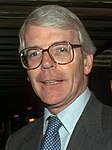United Kingdom local elections, 1995
|
|
|||||||||||||||||||||||||||||
|---|---|---|---|---|---|---|---|---|---|---|---|---|---|---|---|---|---|---|---|---|---|---|---|---|---|---|---|---|---|
|
|||||||||||||||||||||||||||||
|
All 36 metropolitan boroughs, all 14 unitary authorities, all 274 English districts, 29 out of 32 Scottish council areas and all 22 Welsh principal areas |
|||||||||||||||||||||||||||||
|
|||||||||||||||||||||||||||||

Colours denote the winning party, as shown in the main table of results.
|
|||||||||||||||||||||||||||||
The 1995 United Kingdom local elections took place on 4 May 1995. The Conservative Party lost over 2,000 councillors in the election, while the Labour Party won 48% of the vote, a record high for the party in local elections.
The elections were the first to be contested under Labour's new leadership of Tony Blair, who had been elected the previous year following the sudden death of his predecessor John Smith.
This was also the first election of 22 Welsh and 14 English unitary authorities, creating shadow authorities which ran in parallel with existing councils until taking power in April 1996, except for the new Isle of Wight Council which took power immediately.
All 36 metropolitan borough councils had one third of their seats up for election.
These were the first elections to the first 14 unitary authorities established by the Local Government Commission for England (1992). They acted as "shadow authorities" until 1 April 1996.
‡ New ward boundaries from predecessor authorities
In 167 districts the whole council was up for election.
These were the last elections to the district councils of Blackpool, Bournemouth, Bracknell Forest, Darlington, Leicester, Luton, Newbury, Nottingham, Plymouth, Poole, Rutland, The Wrekin, Torbay, Warrington and Windsor and Maidenhead before they were made unitary authorities by the Local Government Commission for England (1992).
...
Wikipedia



